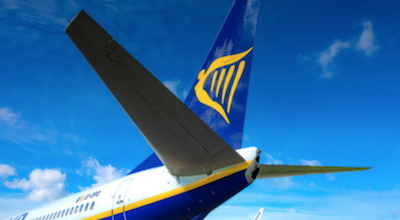Dublin-based Ryanair Holdings reported half-year after tax profit of €1.37 billion, compared to a loss of €48 million in the first half of the prior year and a pre-Covid H1 profit of €1.15 billion.
Europe’s biggest discount airline said the profit came amid record second quarter traffic “and robust summer fares which in Q2 were 14% up on pre-Covid pricing.”
During the six month period to the end of September, Ryanair said summer traffic recovered strongly to 95.1 million passengers from 39.1 million in the first half of the prior year and up 11% over a pre-Covid total of 85.7 million.
Total revenue rose by more than 200% to €6.62 billion.
Ryanair said it is “modestly raising” its FY23 traffic guidance “to 168m passengers (previously 166.5m), up 13% on our pre-Covid traffic.”
Ryanair CEO Michael O’Leary said in a statement: “Record Q2 traffic and strong peak summer fares (+14% over pre-Covid) offset a weak Easter in Q1, which saw traffic and fares damaged by Russia’s invasion of Ukraine in late Feb.
“Ancillary revenue delivered a solid performance with spend increasing to €23 per passenger. Total revenue jumped by over 200% to €6.62bn.
“While sectors more than doubled and traffic increased 143%, operating costs rose just 126% to €4.98bn (incl. a 205% increase in fuel to €2.18bn), driven by lower variable costs, higher load factors and improved fuel burn from our Gamechanger fleet.
“Cost per passenger (ex-fuel) fell below €30 in H1 (slightly lower than the same period pre-Covid) …
“Concerns about the impact of recession and rising consumer price inflation on Ryanair’s business model have been greatly exaggerated in recent months.
“As the lowest cost producer in Europe, we expect to grow strongly in a recession as consumers won’t stop flying, but rather they will become more price sensitive.
“Like Aldi, Lidl, Ikea and other price leaders our very strong post Covid recovery shows that price will continue to drive market share gains as we add low cost, more fuel efficient, aircraft to our fleet over the next 4 years.
“As Europe recovers from the 2-year Covid pandemic there has been a considerable contraction of short haul capacity, much of which will not return in the medium term.
“Most of our EU competitors have cut capacity by up to 20% this Winter while Ryanair will offer 10% more seats than pre-Covid.
“As our H1 traffic and market share growth shows, millions of passengers are switching to fly with Ryanair for our lower prices, our industry leading reliability and our greener, fuel efficient aircraft.
“Consumer propensity to travel remains high in Europe as a result of full employment, rising wages and 2 years of pent-up-demand and accumulated savings while people were ‘locked up’ during Covid.
“We expect these strong fundamentals will continue to underpin robust traffic and ave. fare growth for the next 18-months at least, and Ryanair will be the main beneficiary of these trends so long as there are no negative developments this Winter such as Covid variants or Ukraine.”
In his outlook, O’Leary added: “The recovery for the remainder of FY23 remains fragile and could yet be impacted by new Covid variants or adverse geopolitical events such as Ukraine.
“However forward bookings (both traffic and fares) remain strong over the Oct. school mid-terms and into the peak Christmas travel period.
“We hope to avoid any repeat of last year’s Omicron lockdowns which damaged last Christmas at such short notice.
“As is normal, at this time of year, we have almost zero visibility into Q4 which is traditionally our weakest quarter and which this year doesn’t have any Easter benefit.
“While we remain dependent on Boeing meeting their delivery commitments, especially for Christmas extras and Spring mid-term, we are modestly raising our FY23 traffic guidance to 168m passengers (previously 166.5m), up 13% on our pre-Covid traffic.
“We remain hopeful that full-year fares will remain ahead of FY20 (pre-Covid) by a mid-to-high single digit percentage but we remain cautious that yields could be impacted at very short notice in H2 as they were last year by Omicron in late Nov. which damaged Christmas and the Ukraine invasion on 24 Feb. which so clearly damaged Mar. and Apr. traffic.
“If we are fortunate to avoid such negative events like Covid and Ukraine in H2 then, thanks to our very strong traffic recovery, our advantageous fuel and currency hedges and our widening cost and market share leadership over competitors, we are hopeful that we will minimise our winter losses which would enable us to deliver an FY23 PAT (pre-exceptionals) in a range of €1.00bn to €1.20bn.
“This cautious guidance will remain hugely dependent on not suffering adverse events this Winter (as we did last, which were clearly beyond our control).”
